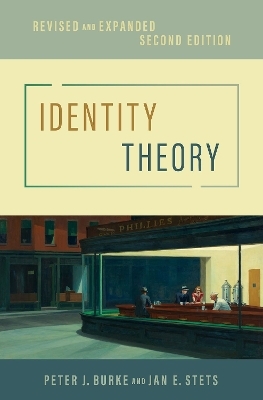
Identity Theory
Oxford University Press Inc (Verlag)
978-0-19-761719-9 (ISBN)
Peter J. Burke is Distinguished Professor of the Graduate Division at the University of California at Riverside (UCR). He has served as Chair of the Department of Sociology at UCR Chair of the Department of Sociology at Indiana University, Bloomington, and Editor of Social Psychology Quarterly. One of the originators of Identity Theory, his research draws on Complexity Theory, Artificial Intelligence, and Computer Simulation to understand (1) how individuals, acting as agents with specific identities, come together in interaction to create groups, organizations and societies, and (2) how these social structures constrain and limit the kinds of actions that individuals can take. He has published over 90 research papers and 5 books. He is a Fellow of the American Association for the Advancement of Science and Fellow of the Association for Psychological Science. He is past chair of the American Sociological Association (ASA) Section on Social Psychology and the ASA Section on Theory. He is the winner of the 2003 ASA Cooley-Mead Award for Lifetime Contributions to Distinguished Scholarship in Social Psychology. He is the recipient of research grants from the National Science Foundation. Jan E. Stets is currently Distinguished Professor in the Department of Sociology and Director of the Social Psychology Research Laboratory at the University of California, Riverside (UCR). She has served as Co-Chair of the Department of Sociology at UCR, Director of the Sociology Program at the National Science Foundation, and Co-Editor of Social Psychology Quarterly. She works in the areas of self and identity, emotions, and morality. She is the author of 10 books and over 100 papers. Her Sociology of Emotions (2005) has been translated into Japanese, Croatian, Polish, and Chinese. Her Handbook of the Sociology of Emotions (2007) received the 2008 Outstanding Contribution Award from the American Sociological Association (ASA) Section on Emotions. She is a Fellow of the American Association for the Advancement of Science and Fellow of the Society for Experimental Social Psychology. She is past chair of the ASA Section on Emotions, the ASA Section on Social Psychology, and the ASA Section on Altruism, Morality, and Social Solidarity. She is the 2020 ASA Cooley-Mead Award for Lifetime Contributions to Distinguished Scholarship in Social Psychology. She is the recipient of research grants from the National Science Foundation.
Preface
Chapter 1: Agency and Social Structure
Chapter 2: The Origins of Identity Theory
Chapter 3: The Development of Identity Theory
Chapter 4: Identity Meanings and Resources
Chapter 5: The Characteristics of Identities
Chapter 6: The Identity Model
Chapter 7: Identity Verification: Processes
Chapter 8: Identity Verification: Outcomes
Chapter 9: Bases of Identities
Chapter 10: Multiple Identities
Chapter 11: Identity Change
Chapter 12: Future Research
References
Index
| Erscheinungsdatum | 23.11.2022 |
|---|---|
| Zusatzinfo | 13 b/w line drawings; 1 table |
| Verlagsort | New York |
| Sprache | englisch |
| Maße | 237 x 154 mm |
| Gewicht | 458 g |
| Themenwelt | Geisteswissenschaften ► Psychologie ► Allgemeine Psychologie |
| Geisteswissenschaften ► Psychologie ► Sozialpsychologie | |
| Sozialwissenschaften ► Soziologie | |
| ISBN-10 | 0-19-761719-0 / 0197617190 |
| ISBN-13 | 978-0-19-761719-9 / 9780197617199 |
| Zustand | Neuware |
| Informationen gemäß Produktsicherheitsverordnung (GPSR) | |
| Haben Sie eine Frage zum Produkt? |
aus dem Bereich


